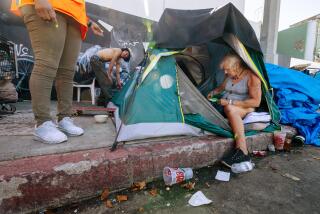Homeless Dish Out Skepticism to Riordan
- Share via
Los Angeles Mayor Richard Riordan, whose first mayoral campaign was criticized for demonizing the homeless and whose administration has been knocked for its handling of the problem, traveled to skid row Wednesday and ran smack into the skepticism of those same needy people.
Surrounded by thousands of men and women seeking shelter from the rain and a hot holiday meal, Riordan spent more than an hour doling out mashed potatoes and gravy at the Los Angeles Mission, a much-admired center in the heart of one of the city’s most threadbare neighborhoods.
The mayor took to the task diligently, chatting with minor celebrities and would-be governor Gray Davis, but broke away at the first opportunity to meet with several homeless people. He won their affection with his kind remarks and concern--but he failed to convince some that his record as mayor deserved their support.
“He’s a nice guy,” said Jessie Mikel, who has been without a roof over his head for five months and who waited in a line that stretched nearly a block outside the mission.
Two seats down, Charlie Brooks agreed. But he, like many, added a note of unhappiness.
“Why do we have a four-year waiting list for affordable housing?” asked Brooks. “We have abandoned apartment buildings right in this neighborhood, but we don’t have enough affordable housing. I mean, I’m getting by, but I could use a place of my own. A hotel’s OK, but it’s not the same as a place of your own.”
For many of those people, Riordan’s personal kindness, his willingness to serve meals and his patience in talking to some of those at the event seemed jarringly at odds with the way they perceive him--as a mayor who has done too little to help them and as an advocate of an anti-panhandling ordinance that would lock up those who aggressively beg for money. To the homeless, the law is an attack on people who already have almost nothing to lose.
“I think that’s ridiculous,” Faun Pointer said of the ordinance that Riordan promoted and that is intended to make it illegal to beg for money aggressively. “That will make . . . people do something else for money. It’ll make the crime rate go up. How can he have the nerve to do that and then come down here and be with us?”
Outside the mission, Riordan fiercely defended his record of helping the homeless, while acknowledging that there is more to be done.
Specifically, the mayor stressed that the anti-panhandling ordinance, which for the moment is not being enforced because a federal judge has blocked it from taking effect, is not intended to stop all begging, just to prevent begging that threatens others.
“The message didn’t get out. We’re not stopping panhandling,” Riordan said. “The ordinance just prevents abusive panhandling. We need to do a better job getting that message out.”
They mayor added that abusive panhandlers--beggars who accost or threaten others--do not help anyone. Likewise, he said city laws barring sleeping on the street need to be enforced.
“This city should not tolerate any violation of its laws,” he said.
But while that may make sense to the mayor, it does not do much for Richard McKay, a 50-year-old homeless man who wolfed down a plate of turkey, potatoes, gravy and cranberry sauce.
“I’ve panhandled before and will again,” he said. “It’s aggravating that they have this law. These people are just trying to get some money without breaking into a car or something.”
*
Later, told of those and other criticisms, Riordan flashed with anger.
“You have these poverty pimps that have an ax to grind,” he said. “For the homeless who want shelter, there’s room. There’s adequate food for those who will come in and get it. That’s not saying that adequate is enough. We should always be trying to do better.”
Riordan’s record on homelessness has long been criticized, beginning with his 1993 campaign for mayor. In that race, Riordan’s literature made dramatic use of a photograph of a menacing homeless man in Hollywood, and his campaign approached homelessness not so much as a human tragedy, but as a blight to be eliminated--a “daily assault on our sense of safety, security and civic pride . . . and a major tourist liability.”
That rhetoric alarmed advocates for the homeless, some of whom remain highly critical of the mayor’s policies, even as they praise his personal generosity. On Riordan’s watch, there have been steps toward cracking down on homeless people who break the law, but there is little evidence that the problem is waning.
Official estimates of the number of homeless vary wildly. The Los Angeles Police Department has estimated that between 3,500 and 4,000 people sleep on the streets on any given night, but those statistics are widely dismissed. In fact, mission officials expected to feed more people than that on Wednesday alone. Some advocates for the homeless put the number of people without permanent, reliable housing as high as 43,000.
*
Although Riordan argues that there are enough shelter beds in the city to accommodate the need, many homeless people say they are more concerned by the lack of permanent affordable housing units. Advocates for the homeless also say they have seen no sign that the number of homeless people has decreased during years in which jobs have become more plentiful.
“We’ve probably seen some increases,” Mike Edwards, president of the Los Angeles Mission, said Wednesday, adding that the facility just added about 90 beds and is reaching out to other parts of the city in order to try to help the widely scattered homeless population.
Riordan praised the mission, which receives no government assistance, and said that a tough approach to preventing so-called quality of life crimes, like abusive panhandling, ultimately is the best thing for all residents, including the homeless. As he often does, the mayor pointed to the example of New York City, which cracked down on abusive begging and other low-level crimes and saw its crime rate drop to the lowest levels in a generation.
In many cases, the biggest beneficiaries of the drop in New York crime have been its poorest neighborhoods, where residents once burdened by fear now live in relative peace.
“That,” said Riordan, “is good for everybody.”
It is not good enough for Michael Robb, a 47-year-old man who came to the mission Wednesday and who said he has spent the better part of 10 years homeless.
Dressed in a blue jacket and carrying a baseball cap because the mission rules do not allow him to wear a hat indoors, Robb ate his meal with his wife and niece. Afterward, he said he was glad the mayor had come, but that he wanted more--training programs for homeless people trying to break out of poverty, increases in benefits that the government intends to cut, help in landing a permanent place to live.
“I don’t see anything he’s done,” Robb said. “He’s not trying to help. None of them are. I tell you what I need. I need a job.”
More to Read
Sign up for Essential California
The most important California stories and recommendations in your inbox every morning.
You may occasionally receive promotional content from the Los Angeles Times.











